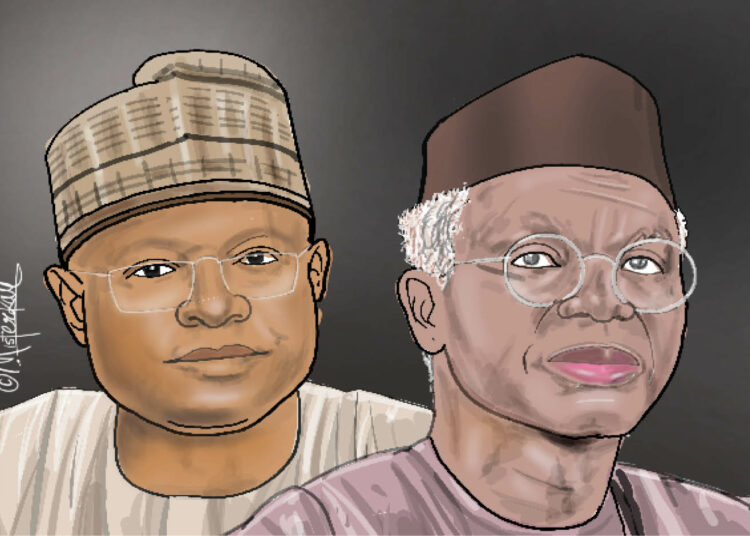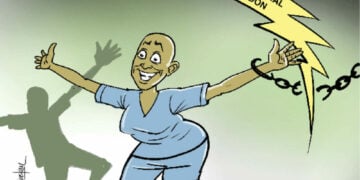President Bola Ahmed Tinubu’s visit to Kaduna last week was more than a routine political engagement; it was a masterclass in narrative control and political reframing. Addressing a large, expectant crowd, Tinubu praised Governor Uba Sani, lauding his leadership for transforming Kaduna “from a toxic zone to a hub of progress.” To the casual observer, this appeared to be straightforward commendation. Yet beneath this public display of approval lies a nuanced, calculated exercise in rewriting the political history of Kaduna.
What makes Tinubu’s statement compelling, and politically significant, is the subtle but unmistakable jab at the previous regime, a regime helmed by Mallam Nasir El-Rufai. Though the former governor’s name was never uttered, the insinuation was clear enough for all who have followed Kaduna politics: the era under El-Rufai’s watch was, at best, toxic. This strategic silence embodies what political sociologists call “framing by omission,” a powerful rhetorical device that allows a speaker to redefine realities without open confrontation.
The Apprenticeship of Power: Uba Sani’s Rise
Uba Sani’s ascent to the governorship was itself a narrative deeply woven with political framing and repositioning. Initially a political advisor and later special adviser on stakeholders’ engagement in El-Rufai’s administration, Uba Sani’s political career benefitted from close proximity to power. Yet, his elevation to senator and now governor signals a quiet but deliberate distancing from his former patron’s legacy.
Uba Sani’s campaign under the “Sustain Agenda” slogan was marketed as a continuation of El-Rufai’s policies. Yet Tinubu’s praise subtly recasts Uba Sani as the architect of Kaduna’s transformation, implying a renewal that distinguishes itself from the past. This is an example of what historians and political theorists describe as “narrative reappropriation”, when a political successor claims credit while downplaying or redefining their predecessor’s impact.
Such political repositioning is reminiscent of Julius Caesar’s rise in Rome. Caesar, initially allied with powerful figures like Pompey and Crassus, carefully manipulated his alliances and public perception to emerge as the dominant power, eventually eclipsing his former colleagues. Uba Sani’s trajectory, although on a smaller scale, follows this pattern of an apprentice outgrowing his mentor through narrative control and political recalibration.
The Master of Frames: Nasir El-Rufai’s Political Craft
El-Rufai himself was a master framer, skilled in shaping not just public perception, but the political reality around him. His tenure as Federal Capital Territory Minister under President Obasanjo showcased his ability to blend governance with narrative power. Bulldozers clearing slums became symbols of “reform” and “progress” rather than displacement and hardship. Surveillance and control became metaphors for order and discipline.
El-Rufai’s time in self-imposed exile during President Yar’Adua’s tenure did not silence his political influence. Instead, it gave him space to refine his narrative strategies. Through sharp op-eds, interviews, and alliances, he framed the People’s Democratic Party (PDP) as corrupt and inefficient while casting himself as a reformist moral authority. His framing of Atiku Abubakar as emblematic of PDP’s decadence and Buhari as the indispensable “strongman” of Nigeria’s future governance is a textbook example of political projection.
This approach draws parallels with Machiavelli’s advice in The Prince: a ruler must not only rule but be seen to rule effectively. El-Rufai understood this well – governance was inseparable from the stories told about governance. As historian Herodotus chronicled the rise and fall of empires through narrative, so too did El-Rufai narrate his rise through framing.
Historical Analogies of Power and Betrayal
The silent power struggle in Kaduna is not unique in history. Great leaders and empires have long used framing as a weapon to shape legacy and influence.
Xerxes I of Persia, the mighty conqueror, famously ordered the Hellespont whipped after a storm destroyed the bridges he built to invade Greece. This symbolic punishment of nature itself illustrated how rulers must control not just armies but narratives around failures. Like Tinubu’s silent indictment of El-Rufai, Xerxes used symbolic acts to shift blame and preserve authority.
Alexander the Great’s generals, once loyal to their fallen leader, often rewrote his legacy to suit their ambitions, reframing him as a godlike conqueror while justifying their own political ascension. Similarly, Uba Sani’s quiet rise under Tinubu’s endorsement resembles these political heirs who selectively celebrate past legacies to eclipse their creators.
Closer to home, former South African President Thabo Mbeki’s political narrative was shaped and reshaped amidst fierce factional battles within the African National Congress. Mbeki framed himself as the “intellectual” leader, casting rivals as disruptive populists. Yet, when he fell from power, his narrative was swiftly reframed as disconnected and authoritarian. This cyclical reframing is a hallmark of political survival and downfall.
The Power of Framing and Its Subtle Violence
Political framing, as observed by scholars like Erving Goffman, is a “schemata of interpretation” that allows actors to organize experience and guide behavior. In governance and leadership, it is the subtle violence that shapes public consciousness, reconfigures loyalty, and rewrites histories.
Tinubu’s Kaduna speech was a demonstration of this subtle violence. Without naming El-Rufai, he delegitimized an entire era by labelling it “toxic.” This reframing alters collective memory, influencing how citizens understand governance and leadership.
Framing is not merely about persuasion but about power projection. It aligns with Michel Foucault’s notion of discourse as a form of power that structures knowledge and social relations. By recasting Kaduna’s political history, Tinubu didn’t just praise Uba Sani; he projected himself as the ultimate arbiter of legitimacy.
The Crowd and the Politics of Allegiance
The crowd’s response reflects the pragmatic nature of political allegiance. Loyalty in Nigerian politics is often contingent and transactional, shaped by the most immediate frames of power.
These erstwhile defenders of El-Rufai found themselves cheering the man now framed as the symbol of progress. Their shifting allegiance underscores the fluidity of political identity and the persuasive power of framing recalls the dynamics of the Roman Senate during the transition from Republic to Empire. Senators once loyal to Julius Caesar quickly recalibrated their support for Octavian (Augustus) when the narrative shifted. Like the Romans, Kaduna’s political class adapts to the dominant story, often at the expense of past loyalties.
Narrative Ownership and the Future of Kaduna
As such, one can say, Tinubu’s visit signals not just a political endorsement, but a transfer of narrative ownership. While El-Rufai’s policies remain etched in Kaduna’s physical and administrative landscape, public memory is a creature of current storytelling. As narrative scholars affirm, memory is malleable and subject to framing power.
Uba Sani’s political future would be buoyed by the reframing Tinubu facilitated. The governor is no longer merely a custodian of a “sustain agenda” but the protagonist of a new Kaduna story, one that distances itself from toxicity and embraces progress.
This transformation is a reminder that political legacies are not fixed but are contested terrains where the loudest and most strategic narratives prevail.
The Lessons of Framing in Power
Kaduna’s political drama, illuminated by Tinubu’s visit, reminds us that leadership is as much about storytelling as it is about policy. The art of framing, selecting what to highlight, what to omit, and how to recast past narratives, is central to sustaining power.
Whether it is Xerxes punishing the sea, Alexander’s generals rewriting legacies, or Tinubu recasting Kaduna’s leadership, history teaches us that power is inseparable from the stories told about it.





